Travelers looking to experience Morocco’s diverse landscapes and vibrant culture often find the Atlas to Merzouga: 6-Day Desert & Toubkal Summit tour offers a compelling mix of adventure, history, and authentic Berber hospitality. With a well-balanced itinerary, it combines the thrill of conquering North Africa’s highest peak with the serenity of desert life, all at a reasonable price of $808 per person. Our review draws on detailed accounts from past travelers, providing insights into what makes this trip stand out—and what to consider before booking.
What we love about this tour is the chance to climb Mount Toubkal, trek through stunning valleys, and then switch gears to explore the Sahara’s dunes and kasbahs. The knowledgeable guides, like Brahim and Radouane, bring a personal touch, making the experience more immersive. The variety of scenery—mountains, deserts, and ancient towns—keeps the trip exciting. Plus, the authentic food and cultural stops feel genuine, not tourist traps.
However, a notable consideration is the extensive driving involved—up to 7 hours on some days—which might be tiring for some. Plus, the physical demands of the Toubkal trek shouldn’t be underestimated; preparation and proper gear are essential. This tour is best suited for active travelers eager to combine outdoor adventure with cultural exploration, and who don’t mind a bit of long-distance travel.
This journey is ideal for those wanting a comprehensive Moroccan experience, blending trekking, desert adventures, and visits to iconic filming locations like Ait Benhaddou. If you’re comfortable with physical activity, open to a bit of travel fatigue, and eager to see Morocco’s diverse side, this tour offers a lot of value.
- Key Points
- An In-Depth Look at the 6-Day Morocco Adventure
- Day 1: Marrakech to Imlil – Starting the Mountain Trek
- Day 2: Toubkal Summit – Conquering North Africa’s Highest Peak
- Day 3: Imlil to Dades Valley – From Mountains to the Desert Road
- Day 4: Dades to Merzouga – Camel Trekking and Sahara Sunset
- Day 5: Sahara to Ait Benhaddou – Desert Sunrise and Kasbahs
- Day 6: Ait Benhaddou to Marrakech – Cultural Highlights and Return
- What’s Included and What to Consider
- Authentic Experiences and Practical Tips
- The Sum Up
- FAQs
- More Guided Tours in Imlil
- More Tours in Imlil
- More Tour Reviews in Imlil
- Still browsing? Here are more Imlil experiences we've covered recently
Key Points
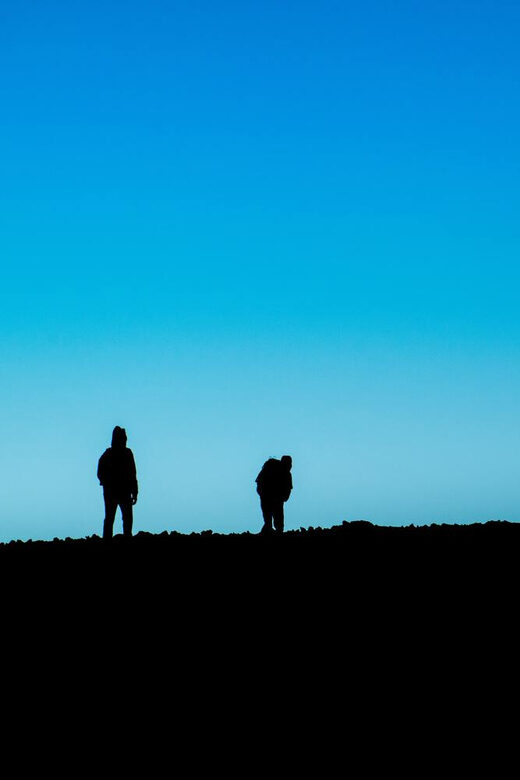
- Balanced itinerary combining mountain trekking and desert exploration
- Expert guides and assistance elevate the experience
- Authentic cultural visits including kasbahs and film studios
- Comfortable accommodations with both hotel stays and desert camping
- Extensive driving can be tiring but allows for scenic routes
- Good value for the price, considering included activities and logistics
An In-Depth Look at the 6-Day Morocco Adventure
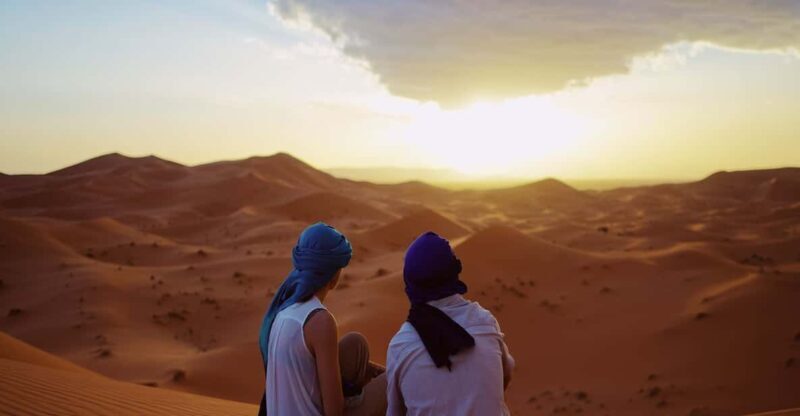
Looking for more options in Imlil? We've reviewed plenty of other experiences.
Day 1: Marrakech to Imlil – Starting the Mountain Trek
Your journey begins with a pickup from Marrakech, heading towards Imlil, a small village at the gateway to the Atlas Mountains. The drive offers stunning views as you ascend over the Tizi-n-Tichka pass, passing through Berber villages and lush river oases. Once in Imlil, the adventure kicks off with a trek to the Toubkal Base Camp at about 3,207 meters.
This first day is physically demanding but rewarding—it’s about 5-6 hours of trekking, depending on your pace. Past travelers mention the excellent support from guides and muleteers; “the food was very good, even when we were in the mountains,” one reviewer noted. Staying overnight at the mountain refuge, you’ll get a taste of mountain life and prepare for the summit.
Day 2: Toubkal Summit – Conquering North Africa’s Highest Peak
The highlight for many is reaching the summit of Mount Toubkal at 4,167 meters. The early start means leaving the refuge before dawn, with the ascent taking about 3-4 hours. The climb is challenging but manageable with proper guidance and some fitness. Guides like Brahim and Mufasta help navigate the terrain, sharing local knowledge along the way.
En route, expect breathtaking views—”the panoramic vistas from the top are unforgettable,” says a reviewer. The climb involves some steep sections, so good footwear and warm clothes are a must; “it’s very cold and windy at the top,” one guest advises. After reaching the summit, the descent takes another 2-3 hours, and you return to Imlil exhausted but elated.
Day 3: Imlil to Dades Valley – From Mountains to the Desert Road
After breakfast, the journey continues with a drive over the Tizi-n-Tichka pass to Dades Gorge, passing through Berber villages and scenic landscapes. Expect about 7 hours of travel, but the scenery makes it worth the long drive. During the trip, travelers can opt to visit the Ouarzazate Film Studios or take an optional hike—adding flexibility depending on your energy levels.
Dades Valley introduces you to Morocco’s desert-adjacent landscapes with dramatic gorges and kasbahs. The overnight stay offers a chance to relax after a long day of travel.
More Great Tours NearbyDay 4: Dades to Merzouga – Camel Trekking and Sahara Sunset
This day combines a visit to Todra Gorge—a stunning fault dividing the High Atlas with dramatic cliffs and palm groves—with a drive to Merzouga. The highlight is the camel ride at sunset, where you’ll trek into the Erg Chebbi dunes for a night at a Berber camp.
Travelers report that the camel ride is “about an hour-and-a-half of gentle trekking,” which is manageable even for first-timers. The camp experience often includes traditional Moroccan dinners, music, and sleeping under a canopy of stars. The overnight stay in tents can vary, with some guests mentioning the possibility of cold at night, so packing warm clothes is wise.
- from Marrakech: atlas mountain issk summit day hik
- Marrakech: Atlas Mountains & Agafay Desert Tour w Camel Ride
- Marrakech: Zipline, waterfall,Lunch, Atlas Mountain day trip
- Marrkech: full day hike in atlas mountain & (lunche guide )
- Half Day Guided Trek departure from Imlil
- Toubkal Ascent Hike 2 Days 1 night in Atlas Mountains.
Day 5: Sahara to Ait Benhaddou – Desert Sunrise and Kasbahs
Waking early for a desert sunrise is a popular experience, allowing you to witness the dunes in the gentle morning light. After a camel ride back to the camp, you’ll visit the Kasbahs of Ait Benhaddou, a UNESCO World Heritage site famous for movies like Gladiator and Game of Thrones.
Travelers are enchanted by the authentic architecture and the stories that guides like Radouane share about the kasbahs’ history. You’ll stay overnight nearby, enjoying local Moroccan hospitality and traditional food.
Day 6: Ait Benhaddou to Marrakech – Cultural Highlights and Return
The final day involves a scenic drive through the Ounila Valley and visits to Telouet Kasbah, another historic stopover. After lunch, the journey back to Marrakech takes around 4 hours, wrapping up your trip with impressions of Morocco’s diverse landscapes.
What’s Included and What to Consider
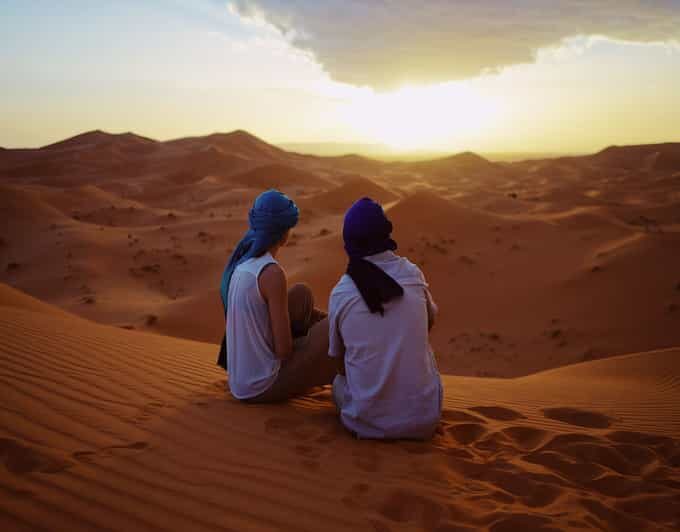
The tour offers excellent value given the variety of experiences—mountain trekking, desert camping, cultural visits, and comfortable hotel stays. Key inclusions like full board meals during the trek, transportation, local guides, and assistance with mules make logistics smoother.
However, travelers should note that long drives are part of the package, potentially tiring, especially if you prefer more rest or less road time. Also, the physical challenge of climbing Toubkal and the desert trek shouldn’t be underestimated; good footwear, warm clothing, and a sense of adventure are essential.
The tour’s flexible booking policy, allowing you to reserve now and pay later, is helpful for planning. Also, cancellations are straightforward—cancel up to 24 hours in advance for a full refund—which adds peace of mind.
Authentic Experiences and Practical Tips
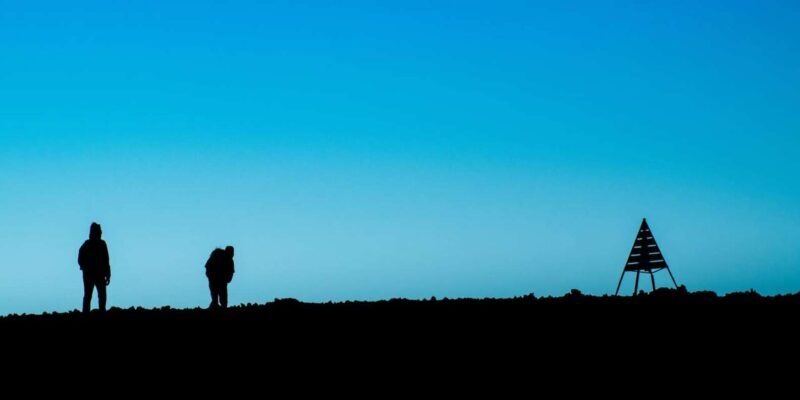
From reviews, it’s clear guides like Brahim and Radouane elevate the journey. Brahim, in particular, was praised for his friendliness and help during the mountain climb—”without him, I’m not sure we would have made it to the top,” shared an adventurer.
The food, often praised for its quality, remains a highlight, especially considering the remote mountain and desert locations. Expect hearty Moroccan dishes, and if you’re lucky, some live music during desert nights. Travelers also appreciated the helpful advice from guides about packing—warm clothes, sunglasses, a water bottle, and a flashlight are essentials.
The camel rides in Erg Chebbi are accessible for most, with the added thrill of desert sunset views. The overnight tents, while offering a taste of Bedouin life, can be cold at night, so packing some extra layers is wise.
The Sum Up
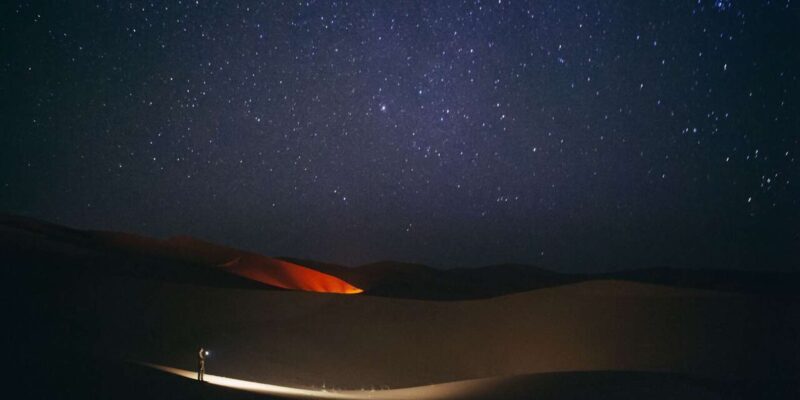
This tour offers a compelling blend of adventure, culture, and scenic beauty that caters well to active travelers eager to see Morocco beyond the usual tourist spots. The combination of mountain trekking with Toubkal’s summit and Sahara desert experiences creates a well-rounded trip that feels both challenging and rewarding.
The expert guides, authentic accommodations, and incredible landscapes ensure you get a genuine taste of Morocco’s diversity. If you’re looking for an itinerary that balances physical activity with culture—while maintaining flexibility—this tour is a strong choice.
While the long drives and physical demands might not suit everyone, those prepared for a spirited adventure will find it incredibly worthwhile. It offers excellent value for the price, with memorable moments in Morocco’s mountains, deserts, and kasbahs.
Ideal for travelers who want a comprehensive, active Moroccan experience and are comfortable with some travel fatigue and outdoor challenges. It’s a trip that leaves you with stories worth retelling and sights you’ll never forget.
FAQs
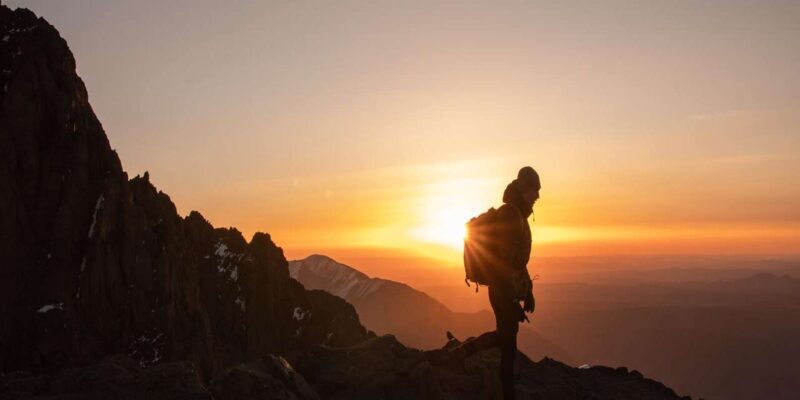
What is the difficulty level of the Toubkal trek?
The trek to Mount Toubkal’s summit is challenging but manageable with proper guidance and fitness. It involves around 8-10 hours of hiking on the second day, so some physical preparation is recommended.
Are the accommodations comfortable?
Yes, the tour includes two nights in hotels (Dades & Ait Benhaddou) and one night camping at the desert dunes. The campsite offers a genuine desert experience, with warm Moroccan dinners and the chance to sleep under the stars.
What should I bring for the trek and desert nights?
Pack comfortable shoes, warm clothes, a towel, sunglasses, sunscreen, a water bottle, a daypack, and a flashlight. The desert nights can be cold, so layering is key.
Is this tour suitable for children or less active travelers?
The physical demands of climbing Toubkal and the desert trek might make it less suitable for young children or those with mobility issues. However, the scenic drives and cultural stops suit most travelers.
How much free time is there during the trip?
Most days involve guided activities and long drives, but there are opportunities for optional hikes and stops, giving some flexibility depending on your energy level.
Will I get to see authentic Moroccan culture?
Absolutely. The tour visits Berber villages, kasbahs, and film studios, providing insight into local life and history, often complemented by guides sharing personal stories.
What is the best time of year to do this tour?
While not specified, Morocco’s best months for such a trip are typically spring and fall, avoiding the extreme heat of summer and cold winter conditions on the mountain.
More Guided Tours in Imlil
- Marrakesh: Mule Ride, Kik Plateau and Imlil Guided Day Trip
- Half Day Guided Trek departure from Imlil
- Marrkech: full day hike in atlas mountain & (lunche guide )
- Marrakech: 2-Day Mount Toubkal Ascent Guided Tour
- Marrakech: Ourika valley day trip, Guided & Camel tours
- Climb Toubkal: 2-Day Atlas Trek with Local Berber Guide
